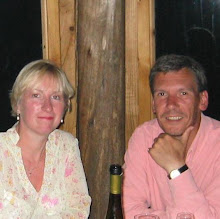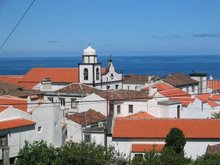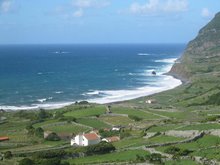The thing about learning a foreign language is you discover how little you know about your own one.
For example, did you know that English only has two tenses -
present ("I work") and
preterite (aka simple past - "I worked")? Portuguese has four - present, preterite, future and imperfect (which is a bit like "I used to work").
Of course, English is quite capable of expressing these extra two tenses and many more besides but has to do it through the medium of compound tenses which employ auxiliary verbs such as be, go, have, will etc. You can really pile these on to come up with such constructs as "I am going to have been working". Don't ask me what that tense is called by the way (and certainly don't ask me to translate it into Portuguese!)
Another thing is that, in my ignorance, I thought the past participle of a verb was simply its preterite (simple past) tense form. The preterite and past participle of "work" are both "worked" but that's because "work" is a regular verb in English. The difference only appears in irregular verbs, for example "to go": the preterite is "went" but the p/p is "gone". Ditto I speak, I spoke (pret.) and I have spoken (p/p) etc. (But not all irregular verbs have p/p's different from the pret. - e.g. I think, I thought, I have thought.)
The p/p is the verb form used in compound past tenses. Scottish football managers (soccer coaches) struggle with this and are wont to deliver themselves of such utterances as "We've came to Celtic Park with low expectations but the lads done great, they've gave 110%, and we've went home with a point, Jim." (They're also apt to dig themselves in even deeper by adding what's known in English as a
Colemanball such as "... we've went home with a point
and you can't do any better than that,
Jim.")
Where was I before I digressed into football? Making an arse of myself, actually, because when I said the p/p is the verb form used in compound past tenses what I meant was compound past perfect tenses. I think. Because there are also compound past continuous tenses - e.g. I was speaking - which employ the present participle ("speaking"). And, indeed, present and future continuous tenses (I am speaking, I will be speaking.) The past participle is also used to form the passive - i.e. "I have been spoken to by her" as opposed to "She spoke to me". Although passive might be a mood as opposed to a tense. I think.
Now Portuguese has compound tenses and participles, past and present, as well. Portuguese past participles are
always different from the preterite (simple past) even with regular verbs. But it's never safe to assume that the same sequence of words translates as the same thing. For example
, Eu estou falando literally translates as "I am speaking" and
Eu tenho falado as "I have spoken" but that's not how you would say either of these things in Portuguese (at least not in European Portuguese - Brazilian may be different).
There's a lot to the learn so the following quote from chapter 40 of Teach Yourself Portuguese Grammar is the understatement of the year:
"It is not surprising that many, if not all, learners throw up their hands in horror at the sheer mention of the word "subjunctive". Having spent precious hours mastering various sets of verb endings, it is frustrating to be presented with a completely new range."
English has a reputation as a dfficult language to learn but at least our verbs are relatively easy and we don't have subjunctive. Or so I thought but actually we do - it's just that subjunctive in English is a bit subliminal and old fashioned and, in practice, nobody bothers about it much anymore. It certainly needn't cause a learner of English to throw his hands up in horror.
If "to boldly go" is the most famous example of a split infinitive, the most famous of the subjunctive's relatively rare appearances in English is "If I were a rich man ..." The fact that it's "
were a rich man" rather than "
was a rich man" is subjunctive, apparently. Also, we know that Jesus saves so have you ever wondered why God
save [not
saves] the Queen? That's subjunctive as well, apparently. You're not ordering God to save the Queen - after all it's not good form to address the Deity in such peremptory terms even where the safety of the Queen is concerned. Rather, you're saying "
Let/may God save the Queen" in the sense of wishing/hoping that He will. And as TYPG tells me, expressions of emotion, doubt, desire, influence and counter factual situations (I'm not a rich man but if I were ...) call for the subjunctive. Life is one big subjunctive, really ...
How did I get started on this again ...?
























